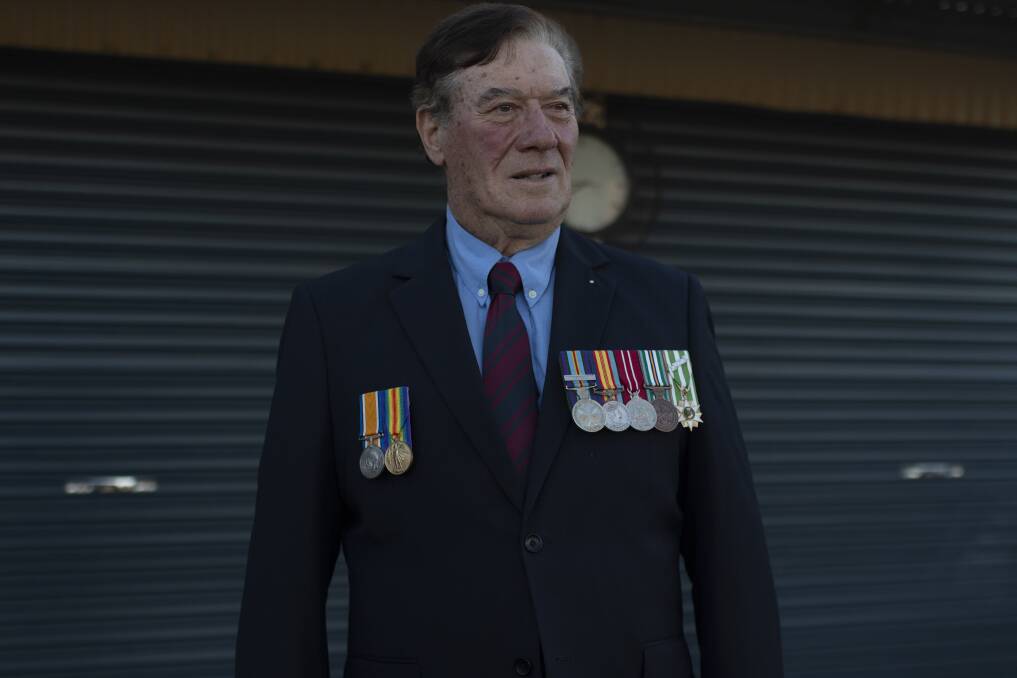When his numbers were called in the 1965 conscription lottery, Kerry Phelan remembers feeling excited.
Subscribe now for unlimited access.
or signup to continue reading

After 342 days station in Nui Dat, north-est of Long Tan, that feeling had evaporated.
Before arriving on the battlefield, he spent eight months in training as a construction engineer.
First in Puckapunyal, Victoria then into NSW and Queensland.
Then on July 13, 1966, just two months after his 20th birthday, Mr Phelan arrived in Vietnam.
A huge experience for someone who had never left the family farm in Western Australia.
“I went from being a farm kid to a soldier in less than a year,” he said.
“As a country lad conscription opened a whole new world. I’d never travelled more than 300 kilometres from home, within nine months I was in a war zone I knew nothing about.”
Related:
Ahead of his medical examination in 1965, Mr Phelan thwarted his family’s efforts to keep him from service.
“My father never wanted me to be in the army, and I was prone to getting heat rash during seeding. A couple days before the medical, he sat me on the tractor with all the windows up tight hoping I’d break out and be knocked back.
“But as soon as he left, I opened all the windows to cool down. I wanted to go, but he was very disappointed when I passed the medical.”
Mr Phelan served as driver in the First Australian Logistic Support Group during the construction of the 11 kilometre ‘barrier minefield’.
“Normally we transported food and supplies from Vung Tau to Nui Dat, but when the mines started to go in, they loaded onto our trucks these massive pallets from the Yanks,” he said.
“We didn’t know what they were until many years later, we found out they were jumping jack mines.”
Mr Phelan left active duty to return to Australia on January 28, 1967.
“We arrived back to Sydney at 6am. There was no welcoming party, no family, no recognition. I was ushered to the Ansett terminal at Mascott to join a flight to Perth,” he said.
“On arrival, my father met me and we drove the two hours back to our farm. We arrvied at about 3pm, we had a cup of tea and my father said, ‘we’ve got lambs to go to market. Go and get the truck ready for the morning.’
“That was it. Within 24 hours I was back from a war zone and into familiar grounds. I was glad to be home, but it was terrible.”
Physically, Mr Phelan returned unscathed but he brought with him a lifetime of traumatic memories to deal with.
“They say post traumatic stress is best dealt with within six months, otherwise it’s life threatening. It stays in your head and the psychological consequences are enormous. With us they didn’t understand that.”
Despite the years of damage, 31 years after leaving Vietnam Mr Phelan returned.
“In 1998, I went back to put the stories in my head to bed. The day we drove down from Saigon, I was a pack of nerves.”
For six months, Mr Phelan and a team of fellow veterans built a preschool in the place where they had once fought.
“I was working with those I had been fighting and by the time we’d finished, I’d dealt with what I’d seen there, and because we did it 62 local children were in fulltime daycare.”
Almost decade later, the centre is about to close. But Mr Phelan has made peace with the legacy he has left in Vietnam.
“We did what wed did and it was successful for eight years. I’m happy with that.”

